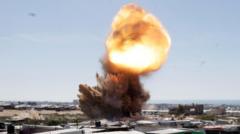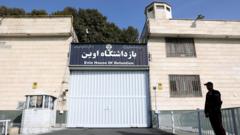Efforts to forge a ceasefire in the ongoing Israel-Gaza conflict are intensifying as new proposals emerge, signaling potential shifts in negotiations between key stakeholders.
New Ceasefire Proposal Emerges in Israel-Gaza Conflict, Trust at Stake

New Ceasefire Proposal Emerges in Israel-Gaza Conflict, Trust at Stake
Intensive negotiations mediated by Qatar and Egypt aim to establish a long-term ceasefire in the Israel-Gaza conflict, with implications for hostages and governance.
In the latest development concerning the Israel-Gaza conflict, a senior Palestinian official has revealed to the BBC that mediators from Qatar and Egypt have introduced a new ceasefire plan intended to bring an end to the enduring hostilities. This proposal outlines a truce expected to last between five to seven years, coupled with the mutual exchange of hostages; specifically, the release of all Israeli captives in exchange for Palestinian prisoners currently held by Israel. The plan aims not only at a formal cessation of conflict but also envisions a complete withdrawal of Israeli forces from Gaza.
A senior Hamas delegation is preparing to engage in talks in Cairo, with the head of its political council, Mohammed Darwish, and chief negotiator Khalil al-Hayya representing the group. These discussions are critical given the recent collapse of a previous ceasefire, which came to an end last month amidst escalating violence between the two sides, each assigning blame for the breakdown.
While Israel has yet to publicly respond to the mediators' outline, Prime Minister Benjamin Netanyahu's recent statements reflect a strong stance against ceasing military operations without the complete dismantlement of Hamas and the safe return of hostages. In direct contrast, Hamas has insisted on a commitment from Israel to conclude hostilities prior to any negotiations concerning the release of captives.
The Palestinian official disclosed that Hamas is open to transferring governance of Gaza to a mutually agreed Palestinian authority, which could potentially involve the West Bank-based Palestinian Authority (PA) or an alternative governing body. However, Netanyahu has firmly ruled out any inclusion of the PA in Gaza's future governance, which has been under Hamas control since 2007.
Though the probability of achieving a lasting peace remains uncertain, the Palestinian source characterized the latest mediation as serious and indicative of Hamas's "unprecedented flexibility." The longer conflict has had devastating human costs, with Hamas's October 7 attack on Israel resulting in approximately 1,200 deaths, predominantly civilians, and the abduction of 251 individuals. In retaliation, Israel's offensive has reportedly led to the deaths of over 51,000 Palestinians, as cited by Gaza's health ministry.
In a related context, the Palestinian Embassy in Cairo has instructed its staff to relocate to Arish, a city near the border with Gaza, to better coordinate medical evacuations and the flow of humanitarian aid amidst the ongoing crisis.
A senior Hamas delegation is preparing to engage in talks in Cairo, with the head of its political council, Mohammed Darwish, and chief negotiator Khalil al-Hayya representing the group. These discussions are critical given the recent collapse of a previous ceasefire, which came to an end last month amidst escalating violence between the two sides, each assigning blame for the breakdown.
While Israel has yet to publicly respond to the mediators' outline, Prime Minister Benjamin Netanyahu's recent statements reflect a strong stance against ceasing military operations without the complete dismantlement of Hamas and the safe return of hostages. In direct contrast, Hamas has insisted on a commitment from Israel to conclude hostilities prior to any negotiations concerning the release of captives.
The Palestinian official disclosed that Hamas is open to transferring governance of Gaza to a mutually agreed Palestinian authority, which could potentially involve the West Bank-based Palestinian Authority (PA) or an alternative governing body. However, Netanyahu has firmly ruled out any inclusion of the PA in Gaza's future governance, which has been under Hamas control since 2007.
Though the probability of achieving a lasting peace remains uncertain, the Palestinian source characterized the latest mediation as serious and indicative of Hamas's "unprecedented flexibility." The longer conflict has had devastating human costs, with Hamas's October 7 attack on Israel resulting in approximately 1,200 deaths, predominantly civilians, and the abduction of 251 individuals. In retaliation, Israel's offensive has reportedly led to the deaths of over 51,000 Palestinians, as cited by Gaza's health ministry.
In a related context, the Palestinian Embassy in Cairo has instructed its staff to relocate to Arish, a city near the border with Gaza, to better coordinate medical evacuations and the flow of humanitarian aid amidst the ongoing crisis.





















